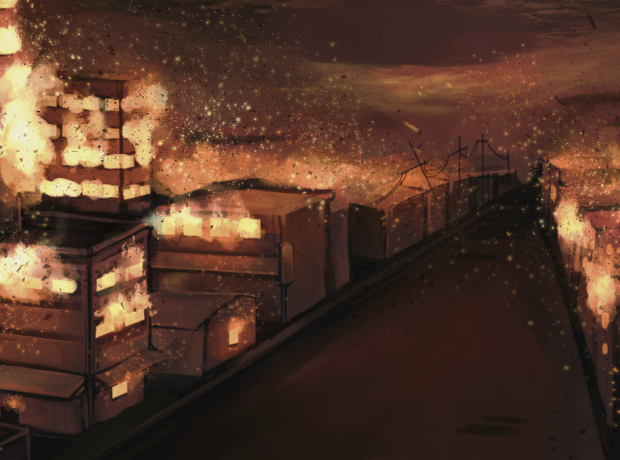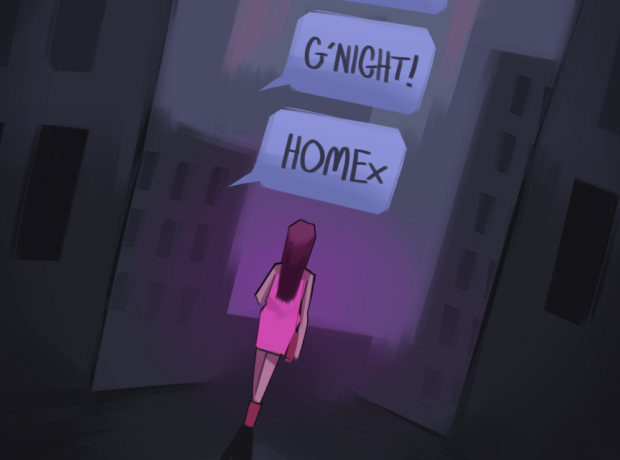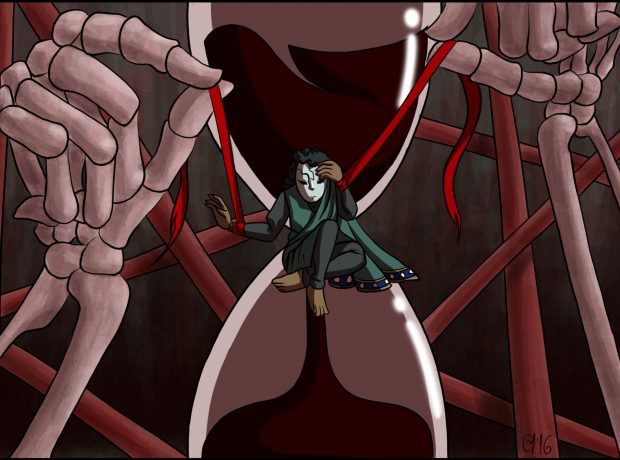There are three words, followed by a neat stack of two black dots written across the back of my right hand that I refuse to wash off. The night previously I took a black pen from my coat pocket and administered the marks myself as a form of protest.
I had attended a performance of Yael Farber’s Nirbhaya, the South African playwright’s award-winning piece based on the events of December 2012 – events that have rather disquietingly become known simply as the ‘Delhi gang- rape’. That December evening, a young Indian student had been lured onto a bus by six men in Delhi’s Munirka neighbourhood, before being quite brutally raped and left for dead. Originally unable to release the identity of the girl, the press named her Nirbhaya: fearless.
Sixteen months later, I had exited the theatre having watched Farber’s piece with two dots inked on my skin and a sense of outrage simmering within.
Nirbhaya is not a play in any simple sense of the term. Knowing the play’s content beforehand is enough to know that what will take place on stage will likely be uncomfortable. Not an occasion for quiet indifference, but for commitment to a cause. (I notice that many members of the audience who have filtered into the theatre before curtain-up with pre-show drinks still in hand, do not touch their glasses again once the production starts until it is over. Even then, it somehow feels improper.) Nevertheless, observing what plays out before me is less of a passive exchange than I have ever experienced in a theatre. We who watch are truly made complicit in what we are witnessing.
Much of Farber’s work over the last decade has dealt with difficult subject matter, often having focused its lens on her native South Africa. Her shift here to India is explained in a post-show discussion, when the director talks of the Delhi incident and how it immediately came to signify a breaking point in India and beyond. ‘In a world saturated with daily horrors of sexual violence, this story punctured our collective indifference,’ she notes. Sharing her opinion, the full cast, accompanying Farber on stage as she speaks, all nod firmly in agreement: they too have been driven to raise a hand speak up. The gesture, the defiantly raised hand, is repeated throughout the play itself in homage to a now memorable photograph, taken during the initial protests over Nirbhaya’s attack.
The play is the product of a collaboration that began with a conversation between Farber and actress Poorna Jagannathan. Jagannathan had contacted Farber only hours after news broke from Delhi, and she summoned the director to India. She was a victim of sexual violence, she told Farber, and she, along with countless others, were ready to take a stand. Fittingly, then, those who ultimately formed the cast alongside Jagannathan were also victims, and the meticulously devised vignettes to which the audience bear witness are their respective testimonies.
Farber recounts the creative process, speaking of her role as writer by night and director and facilitator by day. Her very air on stage, ever subdued and softly spoken, is of one still bearing the weight of an issue unresolved. There is little in the way of merriment from her or those at her side: neither she nor the cast are willing to lap up praise, even for a play so well received.
Such painful memory might preclude artistry; and yet, even the most disturbing moments of the production are handled with an elegance one may imagine inconceivable.
Praise, though, should be given where it is due, and there is refinement amidst the chaos. The set is rudimentary, no more than half a dozen rusting bus seats, window frames and a water vessel strung from high above the stage. But lengths of fabric introduced throughout by the cast, seemingly from nowhere – here laid out as a childhood bed, there becoming a sinister cloak – provide flourishes of brilliance. Such painful memory might preclude artistry; and yet, even the most disturbing moments of the production are handled with an elegance one may imagine inconceivable. The bus attack itself sees Nirbhaya set upon by the rest of the ensemble. As they paw at her dress she, who spends the majority of the play floating around the set singing celestially, slips free of the garment leaving the attackers savaging only an empty dress. Then, when the event is revisited toward the climax of the play, Nirbhaya’s body is dragged centre-stage where it is quite literally soiled, the pristine white of her underdress stained brown. What follows is a cleansing routine of such delicacy – the sullied body bathed by the whole cast almost back to its original virtuousness – that the very repulsion of the attack feels overcome.
Away from the Nirbhaya narrative, too, the verbal testimonies of the cast are enough alone to draw gasps – and they often do. But the monologues, which are true to the words of their speakers, are so deeply heartrending that there often is a dark poetry to them. ‘I’d come an awful long way to be gang-raped in America,’ says one, recounting her attack at the hands of a group of men in New York.
Post-show, with the cast and director now assembled on stage, the question is posed: Why has the case of Nirbhaya been the straw that finally broke the camel’s back? That is, how has the death of one among so many others been met with such a huge response? No one can give a definitive answer, but all on stage are in no doubt that an important shift has taken place. There is a moment early in the play that feels suddenly groundbreaking. Two siblings lie in bed together while a family friend enters and sexually abuses one. The other, bearing witness, speaks up from the darkness. ‘I saw that,’ he says, and in the simple act of acknowledgement takes on the burden of its memory. ‘Silences are what make us complicit in the violence,’ Jagannathan suggests.
Silences are what make us complicit in the violence
I contemplate the question still under discussion, and come to the conclusion that the massive response to the Nirbhaya attack likely has something to do with the absolute unprecedented brutality of what happened – a sense that the actions of the men on that Delhi bus were simply so appalling, so far beyond our erstwhile grasp of sexual violence, that it somehow rendered Nirbhaya’s body not human at all. She became elevated to something more than that. Something symbolic. But as quickly as I think of this, an audience member has posed a more urgent question to the cast: how strong, more than a year on, is the momentum gained in the wake of her death? Indians in their thousands, male and female, had in those days afterwards taken to the streets utterly outraged by the attack. But Jagannathan immediately takes hold of the microphone and, in contrast to her spirited mood so far, responds disconsolately: ‘It is not as strong as it was. It seems we take one step forward and two steps back.’ She references the sad truths that the incident has only emphasised – most depressingly, the endemic level of sexual inequality in India and beyond. Most harrowing is a detail she repeats, that the wrecked body of the victim by the roadside was left ignored by passers-by for more than an hour before police arrived at the scene, and even then the officers were reluctant to touch it for fear of recrimination.
It does much to explain Farber’s glazed expression on stage. Complimentary comments coming thick and fast from the audience do not rouse her from subdued stoicism. In fairness to the donors, the given praise – ‘how very moving’, ‘so harrowing’, ‘that was very, very powerful’ – is often only a polite precursor. They want to know what happens now, what more they can do.
Moral outrage is one thing, but channeling it is another entirely, and the whole format of the play is a nod in this direction. It has been supported by Action Aid, a charity whose presence at the venue offers something of an avenue for the audience to pursue upon leaving the theatre. The post-show discussion, too, is not simply an opportunity for spectators to break down the fourth wall and meet the actors (although their performances might warrant such a response). According to the cast, many people at previous shows have felt in this environment of candidness – an atmosphere not unlike that which the actors had felt in the days after the Delhi attack – the sudden confidence to give voice to their own experiences.
To witness all of this this, the testimony, the anger, the spiritedness, the call for action, is to consume it. I go away with renewed empathy for Farber, the burden- bearer. She says of her work: ‘I gather beads in the dark, and string them together.’ It can be no simple feat.
Before leaving, I look at a postcard that has been placed on mine and every other seat in the theatre. On its white background is printed the red silhouette of a hand, three fingers raised in defiance – the leitmotif of the play. Audience members have been encouraged to write on them. Later these inscribed cards will be displayed on a wall constructed in the foyer. I have passed examples of these from previous performances on my way in: Speak up. Be fearless. Silence is compliance.
For me, though, noticing the way in which the usher receives these postcards – tossed into a basket he holds out before him as spectators depart the auditorium – it seems like one’s good intentions can easily be left at the door. Nothing is wrong with the idea itself, but I feel reluctant to take leave of my message upon exit. And so, deliberately misunderstanding the instruction, I take my pen and imprint three words and two dots on my skin.
Colon. Noun. (1) A punctuation mark used to precede an expansion or explanation.
Two black dots always heralding something more. I saw that:
NIRBHAYA, written and directed by Yael Farber, ran at Southbank Centre, London Wed 5 Mar 2014–Wed 12 Mar 2014
Photo by Leo Reynolds ![]()
![]()
![]()



